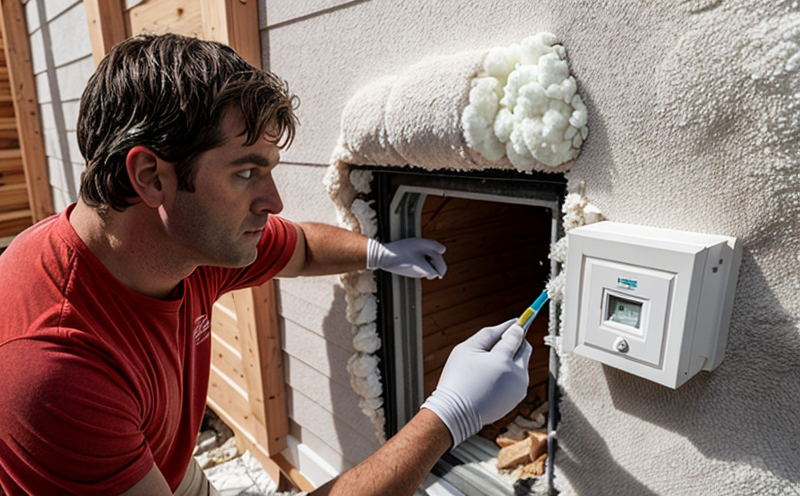ASTM C1363 Building Envelope Thermal Resistance
The ASTM C1363 standard provides a method to determine the thermal resistance of building envelope components using steady-state heat flow measurements. This test is pivotal for ensuring that materials and assemblies meet insulation performance requirements, which are crucial for energy efficiency in buildings.
Thermal resistance (R-value) quantifies how well a material resists heat transfer. ASTM C1363 helps verify the thermal performance of building envelopes, including walls, roofs, and floors, by measuring their ability to maintain temperature differentials under controlled conditions. This ensures that materials perform as expected in real-world applications.
The test involves placing specimens between two chambers with known temperatures. Heat flow is measured through the specimen using sensors, and this data is used to calculate thermal resistance. The procedure also allows for the assessment of the impact of moisture content on insulation performance, which is essential given that moisture can significantly reduce R-values in certain conditions.
ASTM C1363 is widely recognized as a standard method for evaluating thermal properties of building envelope components. It supports compliance with various codes and standards such as ASHRAE, LEED, and the International Energy Conservation Code (IECC). Understanding the nuances of this test helps stakeholders ensure that their projects meet energy efficiency requirements, thereby reducing operational costs and environmental impact.
For quality managers and R&D engineers, ASTM C1363 offers a robust framework for developing and validating insulation materials. By adhering to this standard, they can guarantee that products perform as intended across various climates and conditions. Compliance officers benefit from the clarity provided by ASTM C1363 in assessing whether building envelopes meet regulatory requirements.
The test's precision is particularly important when selecting materials for high-performance buildings or retrofitting older structures. By accurately measuring thermal resistance, stakeholders can make informed decisions that lead to more sustainable and cost-effective solutions.
Customer Impact and Satisfaction
- Enhanced Quality Assurance: Clients benefit from the assurance that their building envelopes meet strict insulation performance standards.
- Cost Savings: By ensuring optimal thermal performance, clients can reduce heating and cooling costs over time.
- Better Compliance: ASTM C1363 supports compliance with local, national, and international regulations.
- Improved Reputation: Demonstrating adherence to industry standards enhances a company's reputation in the market.
Competitive Advantage and Market Impact
The implementation of ASTM C1363 testing can provide significant competitive advantages. By ensuring that building envelope components meet or exceed insulation performance requirements, businesses demonstrate their commitment to sustainability and energy efficiency. This not only enhances customer satisfaction but also positions them as leaders in the industry.
Adhering to this standard helps companies differentiate themselves by offering products and services that are proven to perform under rigorous testing conditions. This can lead to increased market share and better relationships with clients who prioritize sustainable building practices.
The results of ASTM C1363 testing can also influence the broader industry, setting benchmarks for future product development. By aligning with this standard, companies contribute to a more standardized and transparent market environment, which benefits all stakeholders involved in the construction sector.
Use Cases and Application Examples
| Application Case | Description |
|---|---|
| New Construction | Ensure that new buildings meet insulation performance requirements early in the design process. |
| Retrofitting | Evaluate existing building envelopes for potential improvements or compliance with updated standards. |
| Data Validation | Verify the thermal resistance of materials and assemblies before final installation. |
| Sustainability Reporting | Support sustainability reporting by providing verifiable data on insulation performance. |
The ASTM C1363 test is versatile, applicable across various building projects. It ensures that materials perform as expected in real-world conditions, leading to more efficient and sustainable buildings.





